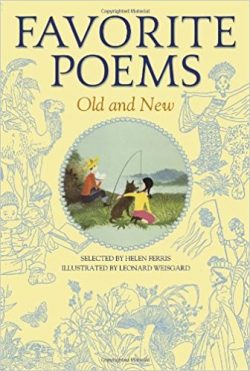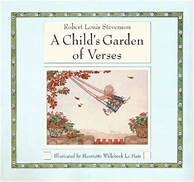
When I was a little girl, we had a great big book of poems. The dark green book with gold lettering was called Favorite Poems Old and New, selected by Helen Ferris. Divided into many sections, the book covered a vast number of subjects: Myself and I, My Family and I, My Almanac, It’s Fun to Play, Little Things that Creep and Crawl and Swim and Sometimes Fly, Animal Pets and Otherwise, On the Way to Anywhere, From the Good Earth Growing; Roundabout the Country, Roundabout Town; My Brother the Sun, My Sister the Moon, the Stars, and Mother Earth; Bird-Watcher; People to Know; Friends to Make; Almost Any Time is Laughing Time; My Fancy and I; Sign of My Nation, Great and Strong; From All the World to Me; Story Time is a Special Time; and From the Family Scrapbook. With its acknowledgments, indexes of authors, titles, and first lines, this book runs to almost 600 pages, no kidding. I guess you could call it a weighty tome.
I eat my peas with honey, I've done it all my life. It makes the peas taste funny, But it keeps them on my knife. --Gelett Burgess
Of course, I am not recalling any of this from memory–once I found that the book was still in print, I ordered a copy. I had visions of sitting with my grandchildren and introducing them to the ones we used to beg my dad to read: all the poems by Ogden Nash and Edward Lear, all the limericks, “Jabberwocky,” and other Lewis Carroll favorites like” “Father William” (“You are old Father William,” the young man said, “And your hair has become very white; And yet you incessantly stand on your head–Do you think, at your age, it is right?”), and “The Walrus and the Carpenter.” We never got tired of hearing the poems of Gelett Burgess (“Purple Cow” and “Peas”). A.A. Milne is well represented in this book, as well he should be.
We were introduced to spoonerisms with Lear’s “Once a Big Molicepan.” Hilarious.
At bedtime, my father read to us from this giant book o’poems. Depending on what he was in the mood for, he would read us about the brave Barbara Frietchie in a poem by John Greenleaf Whittier (“Shoot if you must, this old gray head/But spare your country’s flag,” she said.) Or maybe he would read us “The Charge of the Light Brigade” by Alfred Tennyson:
My sister and I got introduced to poets and writers we would come across much later: William Carlos Williams, T.S. Eliot, Robert Frost, William Blake, J.R.R. Tolkien, Emily Dickinson, Langston Hughes, Carl Sandburg, Wallace Stevens, Edna St. Vincent Millay, James Joyce, Dylan Thomas, Don Marquis, Henry Wadsworth Longfellow, Edgar Allan Poe and others.
 Not only did I love the stories in the poems, but also the new words and phrases: India-rubber ball, or arrant sleepyhead.
Not only did I love the stories in the poems, but also the new words and phrases: India-rubber ball, or arrant sleepyhead.



Risa, what a marvelous anthology! And so great that your father read from it each night to you. I loved “The Swing” too and used it as an audition piece once. And yes! Rocky and Bullwinkle! I can still hear Bullwinkle’s voice reciting “The Swing” with Rocky going up and down in one. I loved that show as a kid, watching with my brother, and my kids loved the tapes. I am right there with you on so many of the poems you mention.
Thanks, Betsy! I wanted to start this piece off with “Greetings, poetry lovers!” just like on the show!
I love your memories of the poetry anthology from your childhood. You brought back many forgotten but happy memories for me of poems I loved as a child. I also read these to my children and attempted to read them with my grandkids. Passing down the beautiful legacy of children’s poems is so important.
Hi Laurie. I’m hoping to corral the littles and read them some poems next time they’re over at my house! So many good ones to share!
Risa, I love that you found the Favorite Poems book still in print and ordered a copy! I don’t think I had that particular book as a child, but I certainly know all the poems you mention. “I eat my peas with honey” was a favorite for my sisters and me, as was “I never saw a purple cow.” I didn’t know they were written by the same author. And we loved the poems of Lewis Carroll. My mother’s nickname was Mim, so we used to get a big kick out of saying “all mimsy were the borogoves.”
Thanks for Bullwinkle’s version of Daffodils, that was a new one for me!
Thanks, Suzy. We also loved all the A.A. Milne poems! So many good ones. Our son James got to hear the one about James James Morrison Morrison Weatherby George Dupree/Took great/Care of his Mother,Though he was only three!
But Jaberwocky is so great. And I will still say, “Come to my arms, my beamish boy!” You are welcome for Bullwinkle. I had a tough choice to make–they did so many!
Thanks for this, Risa; I’m still laughing at the Bullwinkle piece. Given how much we enjoyed poetry as children—and not just doggerel, but Wordsworth and Poe and Longfellow—I wonder how it became so intimidating to us as adults?
Hi John. Thanks for your comment. I don’t know the answer to that question, but you’re right!